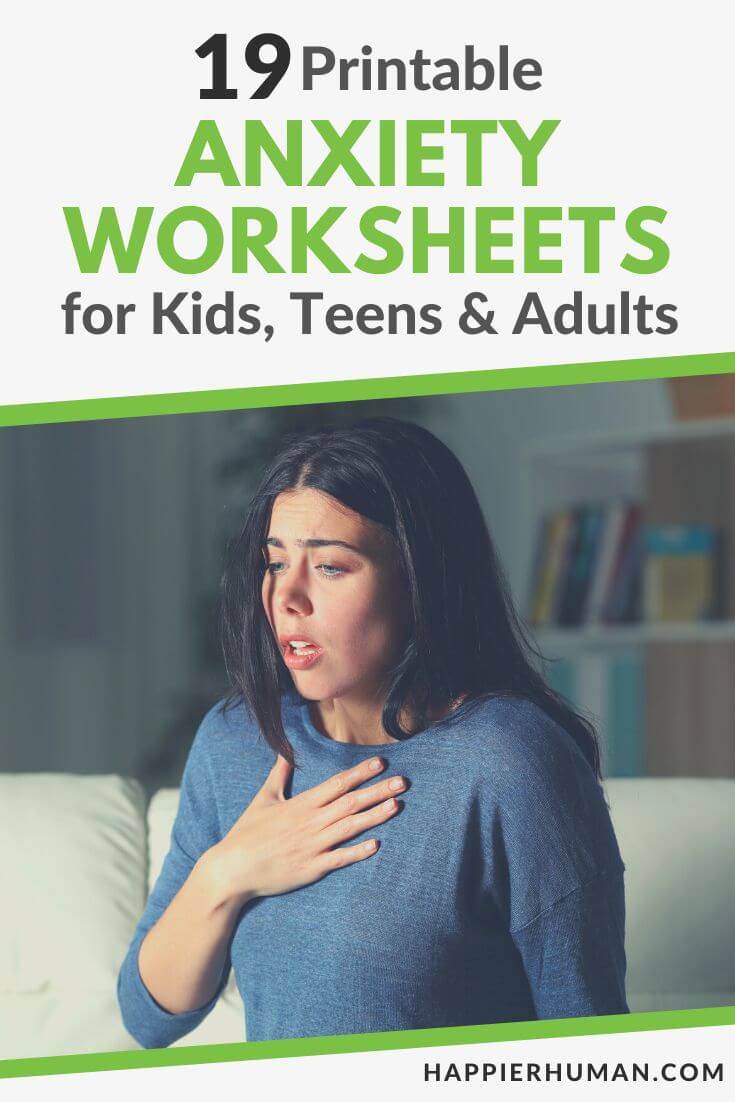There might be affiliate links on this page, which means we get a small commission of anything you buy. As an Amazon Associate we earn from qualifying purchases. Please do your own research before making any online purchase.
Do you feel anxious a lot of the time?
Is it the “normal anxious” that we all feel at some point, or is it the “weirdly anxious” that seems to get out of hand?
It is perfectly normal for people to worry. We can’t help it. There are many uncertainties in life and it’s only natural to stress.
But how do you know if your anxiety is out of control? What do you do when it becomes overwhelming or starts to affect your daily routine?
You can’t say for sure that you have an anxiety disorder unless you see an expert, but as a start, you can always look for ways to determine what triggers your fears. For instance, you can try answering anxiety journal prompts or anxiety worksheets.
In this post, we have gathered 19 printable anxiety worksheets that are suitable for kids, teens, and adults. You can answer them for simple stress relief or use them to determine whether it is time to see a professional.
Let’s check them out!
1. Anxiety Breakdown
Our first entry is designed for kids who may be feeling anxious and need a way to put their thoughts into words. It has easy-to-understand questions and it looks engaging enough to keep children’s interest. Even adults might find it enjoyable to answer.
You can use this worksheet to help your children break down the things that trigger their worries. It can also help them realize how these fears affect their minds and bodies. But most importantly, it can help them find ways to cope with these strong emotions.
2. I Can Cope With Feeling Anxious
Here we have another sheet for kids. It is similar to the previous one, but it provides options at the bottom regarding ways to cope with anxiety. Some children may not know how to deal with their fears, but the list in this worksheet can help them get started.
Anxiety doesn’t discriminate by age. It can attack anytime and anywhere, regardless of who you are. We suggest raising this topic to your children as soon as possible to help them learn early that there is a way to ease those feelings of fear and anxiety.
3. Anxiety Respond-er
Say hello to our new superhero, the Anxiety Responder. Ask yourself: “If there was a person who could respond perfectly whenever you were feeling anxious, what would they say or do to help you calm down?” Jot down your answers in the space provided on the page.
This is an excellent worksheet for kids to practice positive self-affirmations. In addition to relieving their anxieties, you should teach them to appreciate themselves as often as possible. Build their self-esteem so they can avoid dealing with stress and anxiety.
4. Is My Anxiety A Problem?
Feeling anxious is normal. It is inevitable to feel worried about uncertainties. But those feelings become a problem when they begin to control your life.
This worksheet can help you answer questions about anxiety. It is made specifically for children, but we think it also suits teens and adults. If you are wondering whether or not your anxiety is becoming a problem, try answering this worksheet.
5. Anxiety Triggers by Mylemarks
Do you know what triggers your anxieties? There are a lot of factors that may affect your emotions. One of the best ways to deal with them is knowing your triggers.
This worksheet was made specifically for teens, but it is also appropriate for adults and kids. It is easy to answer, since it is just a checklist. You have to give each trigger a grade from 1 to 10, and the statements you rate from 6 to 10 are likely your most potent triggers.
6. Do You Cope in Destructive Ways?
4 Destructive Ways Teens Cope With Anxiety-Free worksheet!
— Jeffrey Bernstein (@DrJeff4Help) November 17, 2020
Source: The Anxiety, Depression, & Anger Toolbox for Teens, https://t.co/AzCwnZuO91 pic.twitter.com/xF7QLIaxCm
This sheet is similar to a “reflection” paper. You have to write down the circumstances that make react out of anger or pressure. It is important to answer this sheet thoughtfully if you want the best possible results.
This page is also a great way to know if you become “destructive” your anxiety takes control. If you realize that you do indeed deal with anxiety destructively, maybe it’s time to consult a health professional.
7. Challenge Anxious Thoughts
According to this worksheet, one way to deal with anxiety is by challenging your anxious thoughts. This is possible, but only if you are determined. You might want to download this free worksheet as a start.
Check out the link above and read more information about how to challenge your worried thoughts. You will find the download button at the bottom of the worksheet, or you can download it safely here.
8. Exploring Social Anxiety
Anxiety comes in various form, and one of the most common is social anxiety. This can significantly impact your life by affecting your relationships with yourself and other people.
Therapist Aid claims that this worksheet is “designed for the early stages of social anxiety treatment.” They made it available for free so that people can identify the issues they are dealing with. We suggest checking it out on your own and then seeking help if it turns out you might have social anxiety.
9. Anxiety Buster
Like many of the other worksheets today, Anxiety Buster looks at both your triggers and coping mechanisms. However, it also has additional sections to help you focus on your goals. It also encourages you to write these goals down instead of keeping them in your memory.
For instance, the worksheet asks you to prioritize three of your “to-dos” per day instead of doing them all at once. It also has a section for your gratitude list and wishes/prayers. At the bottom of the worksheet, you will see a list to help you challenge your fears and become less anxious.
10. Mental Health Worksheet
In addition to anxiety, this worksheet helps address depression. They also call it the “Anxiety Suicide Awareness Sheet,” as it helps determine whether or not a person has suicidal tendencies. Since it is sometimes hard to communicate your feelings through words, this sheet might help you and your family or friends understand each other better.
However, if you or a friend are having suicidal thoughts, we suggest consulting a psychologist immediately. This worksheet aims only to support those having trouble expressing their feelings.
11. Anxiety Triggers
The first step in dealing with anxiety is to identify what triggers it. To identify these triggers, you also have to know the cues that indicate your anxiety. These cues may be physical or cognitive, or a combination of the two.
As described on the site, this worksheet may be used by mental health practitioners or ordinary people who want to learn their triggers. It can be used in therapy sessions or home practices.
12. How to Decatastrophize
This worksheet is not exactly for anxiety, but it is clearly connected to regulating your worries. Decatastrophizing is the method of restructuring your mind to remove cognitive distortions. It eliminates the negative thoughts that you ruminate on in your mind.
Check out this template from Kelly Mental Health and start learning how to decatastrophize. Each section will help you break down your thoughts into smaller pieces until you figure out what causes your worries.
13. Did My Worry Happen?
There are times when we worry about things that don’t actually happen. We overthink and feel like the results are worse than they really are, even though things don’t really turn out to be as bad as we expected.
This worksheet is intended to help you re-evaluate your thoughts and experiences. It aims to help you decide whether or not the things you were worrying about actually happened. If not, then it goes on to help you realize that things aren’t that bad after all.
14. Anxiety Symptoms Checklist
If you simply want to know if you are experiencing severe anxiety or not, then this worksheet is a great option. It is a checklist of 36 items that you could be experiencing at the moment (or at a time when a certain fear happened).
If you see that you have been experiencing the same things over and over again whenever you worry, then it is probably time to seek professional help.
15. My Three Phases of Anxiety
This template gives you three anxiety categories: a little bit anxious, anxious, and very anxious. Each category consists of three questions related to the way you respond, your coping mechanisms, and the things you need from other people.
Breaking down your responses into these three stages can help you deal with your worries.
16. Anxiety Cheat Sheet
This is a detailed worksheet from The Butterfly Mother that has 10 sections that can help you recognize your thoughts and feelings about your anxiety triggers.
The first three questions make sure that you feel safe and comfortable at the time of answering the sheet. The next five then ask you to create a list, with the last column providing a space where you can write action steps to overcome your anxiety. The last two are spaces where you can write useful and motivational information.
17. Anxiety Prep
Here is another worksheet that we find really helpful. It does not address your current worries, but instead prepares you for future worries. If you feel like anxiety is going to attack you because of a certain future event, this is the perfect template to get yourself ready.
There are six sections, all of which are questions that help provide you with a coping mechanism once the event happens. Like all the other worksheets we have introduced today, this sheet helps break down your thought process, except that it is specific to future events.
18. Anxiety Worksheet by Hailey Lott
If you are looking for a simple template that you can either print or get inspiration from and include in your journal, this one fits the bill. It contains simple questions about what happened and how you reacted, plus a rating of your feelings with a space for an explanation.
19. Anxiety Workbook
This anxiety workbook is a good option if a single anxiety worksheet simply won’t cut it. The 15-page workbook consists of several activities to help you identify your anxiety triggers, overcome your worries, and come up with mechanisms to help you stay on guard and on the ground.
Conclusion
We hope we were able to help you find anxiety worksheets that work for you and your loved ones. Remember, however, that these sheets are not intended to provide an official diagnosis. They are only meant to help you recognize your fears and what triggers them.
If you ever feel like you need professional help, consult a mental health expert immediately.
Finally, if you want a simple way to reduce your stress and anxiety, then try writing these 35 mindfulness journaling prompts to live more in the present moment.


